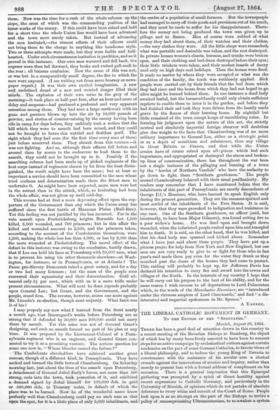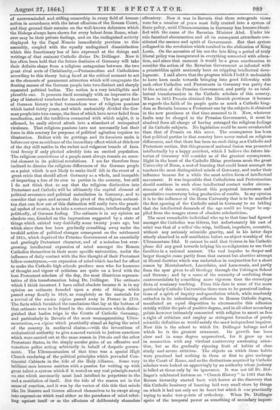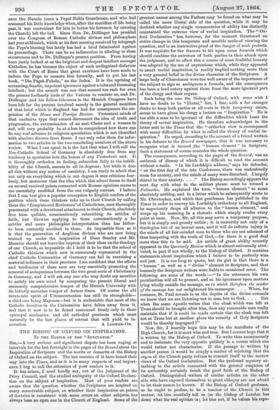THE LIBERAL CATHOLIC MOVEMENT DT GERMANY. To THE EDITOR OF
THE "SPECTATOR." of narrowminded and stifling censorship in every field of human action in accordance with the latest effusions of the Roman Court, and they ground their surmise on the well-known deference which the Bishops always have shown for every behest from Rome, what- ever may be their private feelings, and on the undisguised activity displayed by the Papal Nuncio immediately previous to this assembly, coupled with the equally undisguised dissatisfaction which this functionary has of late expressed at the doings and writings of that eminent Catholic divine Dr. Dollinger. Now it has often been held that the future destinies of Germany will take their definite shape from a religious antagonism between the two great rival sects of Christianity,—Protestantism and Catholicism according to this theory being fated at the critical moment to act as the elements of paramount attraction which will congregate the floating masses of the German people into two distinct and sharply separated political bodies. The notion is a very intelligible and plausible one. It presents itself seemingly with an impressive dis- play of historical vouchers for its correctness. The last great fact of German history is that tremendous war of religious passions which lasted thirty years, and which undeniably divided the Ger- man people into two camps, the lines of which have never faded from recollection, and the traditions connected with which might, it is affirmed, be easily stirred afresh into a stimulant of unimpaired virulence. That religious passions have not necessarily lost their force in this century for purposes of political agitation requires no illustration. Belfast with its guttings and its ferocious mobs is before our eyes as evidence of the inceudiary effect which at this hour of the day still resides in the rudest and vulgarest brands of fana. tical frenzy if only pitched adroitly into an excited population. The religious convictions of a people must always remain an essen- tial element in its political revolutions. I am far therefore from inclined to dismiss the religious differences of the German people as a point which is not likely to make itself felt in the event of a great crisis that should affect Germany as a whole, and incapable of imparting a hue of its own to parties in the country, but still I do not think that to say that the religious distinction into Protestant and Catholic will be ultimately the capital element of political severance and political assimilation in Germany, and to consider that upon and around the pivot of the religious animosi- tief3 that can flow out of this distinction will really turn the practi- cal upshot cif events, is to take a correct estimate, intellectually and politically, of German feeling. The estimate is in my opinion an obsolete one, founded on the impressions suggested by a state of things which existed very decidedly some twenty years ago, but which since then has been gradually crumbling away under the twofold action of political changes consequent on the settlement of 1815, which deprived the Prussian Government of an essentially and gratingly Protestant character, and of a noiseless but ever- growing intellectual expansion of mind amongst the Roman Catholics themselves in their more specific universities, under the influence of daily contact with the free thought of their Protestant fellow-countrymen,—an expansion of mind which has had for effect to make the Catholic high schools produce men who for keenness of thought and vigour of criticism are quite on a level with the best Protestant scholars of the day, the most illustrious represen- tative of this transformation being Dr. Dollinger. The estimate which I think incorrect I have called obsolete because it is in my opinion an estimate founded upon a state of things which passed away finally in 1818, as completely as the materials for a revival of the ancien re:gime passed away in France in 1789. The facts which furnished the conclusions that lay at the bottom of that estimate were to be found in the circumstances which distin- guished that leaden reign in the Courts of Catholic Germany, and particularly in Bavaria of the most uncompromising Ultra- montanism,—a regime which practically aimed at laying the mind of the country in medireval chains,—with the invocations of ecclesiastical authority to give a sacred varnish to jealous exactions which were carried out at the same season in Prussia and the other Protestant States, in the simply secular guise of an offensive and vexatious police acting arbitrarily in behalf of despotic govern- ment. The Ultramontanism of that time was a special High Church rendering of the political principles which pervaded Con- tinental Cabinets in the tide of the Holy Affiance. Some very brilliant men became smitten with a passion for writing up with great talent a system which if it rested on any real principle rested on one which necessarily must lead intellect to perpetrate in the end a mutilation of itself. But the tide of the season set in the sense of reaction, and it was by the vortex of this tide that minds like De lIaistre and Gorres allowed themselves to be swept along into expressions which read either as the paradoxes of mind rebel- ling against itself or as the effusions of deliberately shameless effrontery. Now it was in Bavaria that these retrograde views were for a number of years most fully erected into a system of State policy, until Ultramontanism in Germany has become identi- fied with the name of the Bavarian Minister Abel. Under his rule fanatical obscurantism and all its consequent attendants con- stituted the essence and spirit of Government. But that system ' collapsed in the revolution which resulted in the abdication of King Louis. On the accession of his son the late King a period of truly liberal policy was inaugurated in everything connected with educa- tion, and since that moment it would be a gross anachronism to consider the action of the Bavarian Government as infected with a priestridden spirit anxiously bent on crippling intellectual deve- lopment. I said above that the progress which I hold it undeniable to have been made towards bringing into good fellowship with each other Catholics and Protestants in Germany was partly duo to the action of the Prussian Government, and partly to an intel- lectual transformation in the Catholic scholars of this country. When in 1815 Prussia obtained the Rhenish provinces it became as regards the faith of its people quite as much a Catholic king- dom as Bavaria became a Protestant one by the subjects it obtained in the new provinces at that time annexed to it. Now, whatever faults may be charged to the Prussian Government, it must be absolved from all charge of having outraged the religious feelings of its Catholic subjects. No legislation could be more evenhanded than that of Prussia on this score. The consequence has been that political parties in that country have never rested on religious differences, and that there has been no such thing as a Catholic and Protestant section. But this process of national fusion was promoted intellectually by a happy accident, which I believe the future his- torian of Germany will consider as of the greatest consequence. Right in the heart of the Catholic Rhine provinces arose the great University of Bonn, a seat of learning that could boast amongst its teachers the most distinguished minds of Germany, and under their influence became for a while the most active focus of intellectual movement. It was impossible that Catholicism and Protestantism should continue in such close intellectual contact under circum- stances of this nature, without this perpetual intercourse and speculative controversy being productive of results. In my opinion it is to the influence of the Bonn University that is to be ascribed the first opening of the Catholic mind in Germany to an inkling that the intellectual demands of the age could no longer be sup- plied from the meagre stores of obsolete scholasticism.
The most remarkable individual who up to that time had figured amongst the Catholics was Giirres, but unfortunately his cast of mind was that of a will-o'-the-wisp, brilliant, impulsive, eccentric, without any seriously scientific gravity, and in his latter days utterly absorbed in self-mutilation before an abject worship of the Ultramontane Idol. It cannot be said that Giirres in his Catholic phase did any good towards helping his co.religionists to use their 'faculties in a rational manner. The real impulse to deeper and larger thought came partly from that earnest but abortive attempt at liberal doctrine which was undertaken in conjunction for a short season by Montalembert, Lacordaire, and Larnennais, and partly from the spur given to all theology through the Tubingen School and Strauss ; and by a sense of the necessity of confuting the controversialists by something more vigorous than the stereotype dicta of seminary teaching. From this date in some of the more particularly Catholic Universities there were to be perceived indica- tions of a spirit of inquiry and speculation which, while resolutely orthodox in its unhesitating adhesion to Roman Catholic dogma, manifested an equal disposition to circumscribe this adhesion strictly within the pale of positive dogma, and in all other secondary points however intimately connected with religion to assert as free a right of criticism and employ as stringent formulas of purely scientific definition as would satisfy the most independent inquirer. Now this is the school to which Dr. Dollinger belongs and of which he is the greatest ornament. Its growth has been slow and in some degree unperceived, for it grew up not in connection with any virulent controversy awakening atten- tion, but as the gradually ripening fruit of habits of close study and severe criticism. The objects on which these habits were practised had nothing in them at first to give umbrage to the Court of Rome, and so the distinctions acquired by Catholic scholars were looked on approvingly by an authority whose jealousy is lulled at times only by its ignorance. It was not till Dr. Dol- linger's celebrated lectures on "Church History" in 1861 that the Roman hierarchy started back with horror at the discovery that this Catholic luminary of learning laid very small store by things on which it had not only set its heart but which it was practically trying to make test-paints of orthodoxy. When Dr. Dtillinger spoke of the temporal power as something of secondary import- twee the Nuncio (once a Papal Noble Guardsman, and who had crammed his little knowledge when, after the meridian of life being past, it was convenient for him to better his fortunes by entering the Church) left the hall. Since then Dr. DoHinges has presided over the Congress of Roman Catholic divines and philosophers last year atMunich, which at its first meeting received by telegraph the Pope's blessing but lately has had a brief fulminated against its proceedings. There can be no indiscretion in alluding to these occurrences and to Dr. Dollinger's present position. From having been justly looked at as the brightest and deepest intellect amongst Catholics, he has become the object of such undisguised disfavour with the Court of Rome that great exertions have been made to induce the Pope to censure him formally, and to put his last book, "Die Papst-Fabeln," on the Index. It is the uprising of screaming, frantic, impotent ignorance against a calmand foreseeing intellect ; but the assault was one that seemed too rash for even the present foolhardy lords of the Vatican to venture on, and Dr. Dollinge,r and his fellow-labourers in the Munich Congress have been left for the present involved merely in the general monition of that brief which in England has had for consequence the sus- pension of the Home and Foreign Review. Protestant minds of that exclusive type that cannot disconnect the idea of truth and progression, the extermination of an anti-Christ and a woman in red, will very probably be at a loss to comprehend how there can be any real advance in religious speculation which is not identified with absolute divorce from Rome. I can only refer them for infor- mation to two articles in the two concluding numbers of the above review. What I can speak to is the fact that what I will call the Neo-Catholic School of Germany is absolutely free from any tendency to apostatize into the bosom of any Protestant sect. It is thoroughly orthodox in feeling, subscribes fully to the infalli- bility of the Church, assents to all its dogmas ; but while it does all this without any notion of casuistry, 1 am ready to admit that not only on everything which is not dogma it uses criticism fear- lessly, but moreover that the idea which this school forms to itself on several received points connected with Roman opinions seems to me essentially modified from the one vulgarly current. I believe that I can best give a popular conception to English readers of the position which these thinkers take up in their Church by calling them the "Essayists and Reviewers" of Catholicism, men thoroughly penetrated with a devotional attachment to their Church, absolutely free from quibble, conscientiously subscribing its articles of faith, but likewise applying to them conscientiously a far subtler and more philosophic interpretation than has hither- to been currently ascribed to them. As impossible then as it is that the generation of Anglican divines who are now being trained up under the inspiration of Dean Stanley and Mr. Maurice should not leave the impress of their ideas on the theology of our Church, so impossible do I hold it to be that the school of Catholic thinkers which now is numerously represented in the chief Catholic Universities of Germany can fail in exercising a material influence in their province. I am confident that the efforts and tendencies of these men are very essentially promoting the removal of antagonisms between the two great sects of Christianity in Germany, and I will ask any one who may doubt my assertion to satisfy his own mind by comparing the present liberal and eminently comprehensive temper of the Munich University with its bitterly sectarian temper of former times. Of course the old inveterate spirit of Ultramontanism has still its strongholds— a chief one being Mayence—but it is uudeniable that most of the Catholic faculties in the Universities have fallen away from it, and that it now is to be found ensconced firmly only in those episcopal seminaries and old cathedral precincts which must naturally be the last places of retreat that will yield to in-
































 Previous page
Previous page